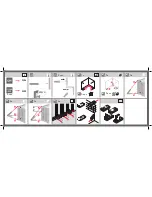
1.4
Functional description
The Gammapilot FTG 671 has been realised as a second generation 19" Racksyst card
with Rackbus connection. It can be configured by the front panel keys, via a Commulog
VU 260 Z handheld terminal, or remotely via a ZA 67
…
Gateway. The transmitter can be
operated in the following modes:
•
Limit switching with two relays using a DG 17/27 Geiger-Müller counter
•
Limit switching with two relays using a DG 57 scintillation counter
Input circuit
The intrinsically safe input circuit of the Gammapilot FTG 671 is electrically isolated from
the rest of the circuitry by a DC/DC converter. The Gammapilot supplies power to the
detector and receives from it a frequency signal proportional to the countrate. Provision
is made for the connection of either a Geiger-Müller or a scintillation counter: the detector
type is set during configuration. For DG 57 detectors, sensor data is supplied in a
separate EPROM (DAT) which must be installed in the FTG 671 during commissioning.
Relays
The transmitter evaluates the incoming signal and switches the level limit relays accor-
dingly. The switching status of each is indicated on the front panel. The functioning of
the relays depends upon the input signal and fail-safe mode configured in the operating
matrix. Correct configuration ensures that the relays always operate in the desired
fail-safe mode:
•
Minimum fail-safe mode:
The relay de-energises and the appropriate red LED lights when the switch-
off point is dropped below, an alarm is detected or the power supply fails
•
Maximum fail-safe mode:
The relay de-energises and the appropriate red LED lights when the switch-
off point is exceeded, an alarm is detected or the power supply fails.
A switching hysteresis is obtained by entering a second switch point. Alternatively the
relays can be operated in acknowledgement mode, whereby they de- or re-energise only
after confirmation in the appropriate matrix field.
Function monitoring
To increase operational safety, the Gammapilot monitors itself for correct function. If a
fault is detected, the red alarm LED lights and the alarm and limit relays de-energise. An
error code can be read from the operating matrix. A fault is detected e.g. when no input
signal is present and when the detector or the input circuit is defective.
The transmitter is also equipped with several automatic protection mechanisms which
ensure that the limits are plausible and do not drift. The reduction in countrate due to
natural decay is corrected for daily, if limits are changed, the switch points are checked
for plausibility and when the source is too weak for correct switching a corresponding
warning is given when the DG 57 detector is in use. The user can now increase the
intergration time, increase the distance between the relay switch points or a new source
must be ordered. Despite the warning, the FTG 671 will continue to measure until the
new source arrives.
Communication
Measured values, events and status as well as the complete transmitter configuration
can be read from the communication sockets on the front panel by a Commulog VU 260 Z
handheld terminal or over the Rackbus by a remote controller operating through a
ZA 67
…
Gateway. The green communication LED lights when data are exchanged. The
switch-over from local to remote configuration via Rackbus is made automatically by
disconnecting the Commulog VU 260 Z from the communication sockets.
Gammapilot FTG 671
Chapter 1: Introduction
9
Summary of Contents for gammapilot FTG 671
Page 4: ...Gammapilot FTG 671 Table of Contents 2...
Page 12: ...Gammapilot FTG 671 Chapter 1 Introduction 10...
Page 28: ...Gammapilot FTG 671 Chapter 2 Installation 26...
Page 32: ...Gammapilot FTG 671 Chapter 3 Controls 30...
Page 48: ...Gammapilot FTG 671 Chapter 5 Limit Switches Relays 46...
Page 50: ...Gammapilot FTG 671 Chapter 6 Maintenance 48...
Page 59: ...Gammapilot FTG 671 Operating Matrix 57...
Page 61: ...Index Gammapilot FTG 671 59...
Page 62: ...Gammapilot FTG 671 Index 60...
Page 63: ...Index Gammapilot FTG 671 61...












































